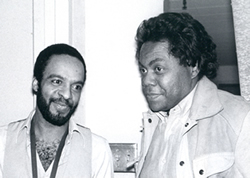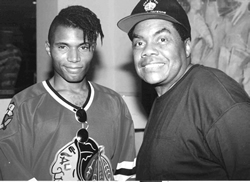News Stories
Former ABC/CNN Producer Takes News Media to Task Over Iraq War
New Information to Combat Diabetes
Michael Jackson Exposed
Behind-the-Scenes Business Book Expected to Resonate with Reading Public
New Book Explores Roots of Anti-Semitism
SelectBooks Launches New Web Domain
|
|
Bob Jones has left the Building
BY STEVEN IVORY: September 23, 2008
 Bob Jones backstage with the late, great Grover Washington Jr. Bob Jones backstage with the late, great Grover Washington Jr.
 Bob Jones (right) with author Adrian Grant: It was Grant's Visual Documentary book that Jones says helped him recall a lot of the details for his own book. Bob Jones (right) with author Adrian Grant: It was Grant's Visual Documentary book that Jones says helped him recall a lot of the details for his own book.
If anyone deserved to know the outcome of the dogfight between the trailblazing Barack Obama and John McCain, it was Bob Jones.
He didn't warrant the results just because he was a black American who'd lived most of his life during times when the mere notion of a black man (or woman) in the White House seemed sheer fantasy.
No, Jones deserved to see the conclusion of this election because for him the business of trailblazing was common ground. Hbe spent much of his professional life working with and for trailblazers, and he blazed a trail or two of his own.
While the average person doesn't know Bob Jones by name, people around the world certainly knew his work.
As Motown Records' Public Relations/Publicity chief from the early 1970s until the late '80s, and later as Vice President of Communications for Michael Jackson's MJJ Productions, Jones controlled much of what the public knew (and didn't know) about some of most influential artists of the 20th century, including Diana Ross, the Supremes, Smokey Robinson, The Temptations, Marvin Gaye, Stevie Wonder, the Jackson 5, the Commodores, Lionel Richie and Rick James, not to men tion Motown's iconic founder and Chairman, Berry Gordy, Jr.
By representing those who practically shaped popular culture, in entertainment industry circles Jones himself became a legend. A fatal heart attack at his Los Angeles home at the age of 72 in many ways marked the end of an era in black entertainment.
Jones' mission was stoking the star-making machinery. When you'd read about a Motown act, be it Diana Ross or High Inergy, whether in the New York Times or Jet Magazine, it was Jones who made it happen.
He was Old School Hollywood. Having cut his teeth before Motown as the first black PR agent at the high-powered Los Angeles-based public relations firm Rogers and Cowan, Jones guarded the reputation of Motown's artists with the avidity of the crotchety guard who initially turned away Dorothy and company at the door of the Wizard.
Despite his often hard line, Jones, well aware of the double standard regarding media in the mainstream (read: white) entertainment industry, treated the black press with respect: If Lionel Richie did an interview with People Magazine, Jones saw to it that Richie also gave time to Jet, Ebony, Essence, Right On!, Black Beat, Black Radio Exclusive and Lee Bailiey's Radioscope, among other black press outlets.
Unlike today, where artists actually vie for tabloid mentions and the attention of the paparazzi, in the '70s, it wasn't hip for an entertainer to publicly act a fool. Turbulent 21st century hip hoppers and video posers would have a hard time under Jones' unyielding hand. I wanted to disappear when, in his office, right in front of me, Jones once reprimanded the rambunctious DeBarges regarding their behavior in public. In the presence of Jones, even Rick James used to watch his language.
Indeed, Jones' personality often drove a hard bargain. He wasn't everyone's cup of tea. However, you always knew where you stood with Bob Jones.
There were disappointments: Jones' acrimonious parting with Michael Jackson was cemented by a 2005 tell-all book Jones co-wrote. Both star and PR man suffered devastating wounds, never to be healed.
However, as storied as his career was as a publicist, Jones' most enduring achievement was that of mentor. Throughout his professional life he nurtured, if not outright launched, the careers of ambitious young photographers, musicians, actors, future managers, agents, industry executives, CEOs, publicists and of course, fledgling, wide-eyed journalists, of which I was one. In his often intimidating fashion, Bob Jones taught me how to correctly create an invoice; how to arrive on time for interviews and how to take notes if my tape recorder somehow malfunctioned.
And as those of us whose lives were personally touched by Jones weep, laugh and reminisce at what a softy he was under that often tough exterior, we all come back to the man's greatest lesson: that to use what you've learned to help someone else reach THEIR goal, is all.
It is difficult for me to imagine this life without Bob Jones. But then, in so many ways, 2008 has left little to the imagination.
Steven Ivory's book, FOOL IN LOVE (Touchstone/Simon & Schuster) is in stores now or at Amazon.com (www.Amazon.com) Respond to him via STEVRIVORY@AOL.COM or MYfeedback@eurweb.com
|